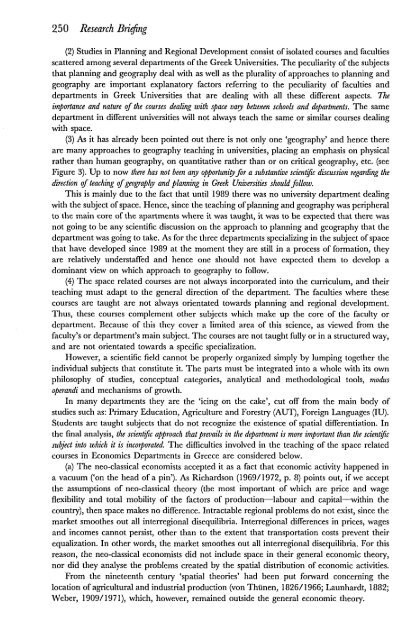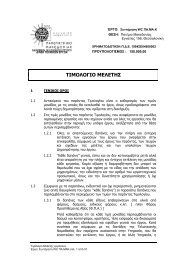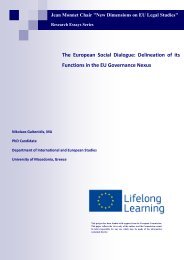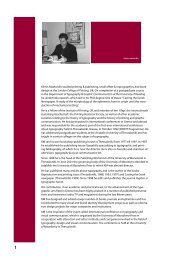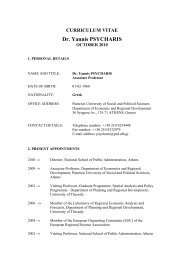The development of planning education and its relation to the ...
The development of planning education and its relation to the ...
The development of planning education and its relation to the ...
You also want an ePaper? Increase the reach of your titles
YUMPU automatically turns print PDFs into web optimized ePapers that Google loves.
250 Research Briefing<br />
(2) Studies in Planning <strong>and</strong> Regional Development consist <strong>of</strong> isolated courses <strong>and</strong> faculties<br />
scattered among several departments <strong>of</strong> <strong>the</strong> Greek Universities. <strong>The</strong> peculiarity <strong>of</strong> <strong>the</strong> subjects<br />
that <strong>planning</strong> <strong>and</strong> geography deal with as well as <strong>the</strong> plurality <strong>of</strong> approaches <strong>to</strong> <strong>planning</strong> <strong>and</strong><br />
geography are important explana<strong>to</strong>ry fac<strong>to</strong>rs referring <strong>to</strong> <strong>the</strong> peculiarity <strong>of</strong> faculties <strong>and</strong><br />
departments in Greek Universities that are dealing with all <strong>the</strong>se different aspects. <strong>The</strong><br />
importance <strong>and</strong> nature <strong>of</strong> <strong>the</strong> courses dealing with space vary between schools <strong>and</strong> departments. <strong>The</strong> same<br />
department in different universities will not always teach <strong>the</strong> same or similar courses dealing<br />
with space.<br />
(3) As it has already been pointed out <strong>the</strong>re is not only one 'geography' <strong>and</strong> hence <strong>the</strong>re<br />
are many approaches <strong>to</strong> geography teaching in universities, placing an emphasis on physical<br />
ra<strong>the</strong>r than human geography, on quantitative ra<strong>the</strong>r than or on critical geography, etc. (see<br />
Figure 3). Up <strong>to</strong> now <strong>the</strong>re has not been any opportunity for a substantive scientific discussion regarding <strong>the</strong><br />
direction <strong>of</strong> teaching <strong>of</strong> geography <strong>and</strong> <strong>planning</strong> in Greek Universities should follow.<br />
This is mainly due <strong>to</strong> <strong>the</strong> fact that until 1989 <strong>the</strong>re was no university department dealing<br />
with <strong>the</strong> subject <strong>of</strong> space. Hence, since <strong>the</strong> teaching <strong>of</strong> <strong>planning</strong> <strong>and</strong> geography was peripheral<br />
<strong>to</strong> <strong>the</strong> main core <strong>of</strong> <strong>the</strong> apartments where it was taught, it was <strong>to</strong> be expected that <strong>the</strong>re was<br />
not going <strong>to</strong> be any scientific discussion on <strong>the</strong> approach <strong>to</strong> <strong>planning</strong> <strong>and</strong> geography that <strong>the</strong><br />
department was going <strong>to</strong> take. As for <strong>the</strong> three departments specializing in <strong>the</strong> subject <strong>of</strong> space<br />
that have developed since 1989 at <strong>the</strong> moment <strong>the</strong>y are still in a process <strong>of</strong> formation, <strong>the</strong>y<br />
are relatively understaffed <strong>and</strong> hence one should not have expected <strong>the</strong>m <strong>to</strong> develop a<br />
dominant view on which approach <strong>to</strong> geography <strong>to</strong> follow.<br />
(4) <strong>The</strong> space related courses are not always incorporated in<strong>to</strong> <strong>the</strong> curriculum, <strong>and</strong> <strong>the</strong>ir<br />
teaching must adapt <strong>to</strong> <strong>the</strong> general direction <strong>of</strong> <strong>the</strong> department. <strong>The</strong> faculties where <strong>the</strong>se<br />
courses are taught are not always orientated <strong>to</strong>wards <strong>planning</strong> <strong>and</strong> regional <strong>development</strong>.<br />
Thus, <strong>the</strong>se courses complement o<strong>the</strong>r subjects which make up <strong>the</strong> core <strong>of</strong> <strong>the</strong> faculty or<br />
department. Because <strong>of</strong> this <strong>the</strong>y cover a limited area <strong>of</strong> this science, as viewed from <strong>the</strong><br />
faculty's or department's main subject. <strong>The</strong> courses are not taught fully or in a structured way,<br />
<strong>and</strong> are not orientated <strong>to</strong>wards a specific specialization.<br />
However, a scientific field cannot be properly organized simply by lumping <strong>to</strong>ge<strong>the</strong>r <strong>the</strong><br />
individual subjects that constitute it. <strong>The</strong> parts must be integrated in<strong>to</strong> a whole with <strong>its</strong> own<br />
philosophy <strong>of</strong> studies, conceptual categories, analytical <strong>and</strong> methodological <strong>to</strong>ols, modus<br />
oper<strong>and</strong>i <strong>and</strong> mechanisms <strong>of</strong> growth.<br />
In many departments <strong>the</strong>y are <strong>the</strong> 'icing on <strong>the</strong> cake', cut <strong>of</strong>f from <strong>the</strong> main body <strong>of</strong><br />
studies such as: Primary Education, Agriculture <strong>and</strong> Forestry (AUT), Foreign Languages (IU).<br />
Students are taught subjects that do not recognize <strong>the</strong> existence <strong>of</strong> spatial differentiation. In<br />
<strong>the</strong> final analysis, <strong>the</strong> scientific approach that prevails in <strong>the</strong> department is more important than <strong>the</strong> scientific<br />
subject in<strong>to</strong> which it is incorporated. <strong>The</strong> difficulties involved in <strong>the</strong> teaching <strong>of</strong> <strong>the</strong> space related<br />
courses in Economics Departments in Greece are considered below.<br />
(a) <strong>The</strong> neo-classical economists accepted it as a fact that economic activity happened in<br />
a vacuum ('on <strong>the</strong> head <strong>of</strong> a pin'). As Richardson (1969/1972, p. 8) points out, if we accept<br />
<strong>the</strong> assumptions <strong>of</strong> neo-classical <strong>the</strong>ory (<strong>the</strong> most important <strong>of</strong> which are price <strong>and</strong> wage<br />
flexibility <strong>and</strong> <strong>to</strong>tal mobility <strong>of</strong> <strong>the</strong> fac<strong>to</strong>rs <strong>of</strong> production—labour <strong>and</strong> capital—within <strong>the</strong><br />
country), <strong>the</strong>n space makes no difference. Intractable regional problems do not exist, since <strong>the</strong><br />
market smoo<strong>the</strong>s out all interregional disequilibria. Interregional differences in prices, wages<br />
<strong>and</strong> incomes cannot persist, o<strong>the</strong>r than <strong>to</strong> <strong>the</strong> extent that transportation costs prevent <strong>the</strong>ir<br />
equalization. In o<strong>the</strong>r words, <strong>the</strong> market smoo<strong>the</strong>s out all interregional disequilibria. For this<br />
reason, <strong>the</strong> neo-classical economists did not include space in <strong>the</strong>ir general economic <strong>the</strong>ory,<br />
nor did <strong>the</strong>y analyse <strong>the</strong> problems created by <strong>the</strong> spatial distribution <strong>of</strong> economic activities.<br />
From <strong>the</strong> nineteenth century 'spatial <strong>the</strong>ories' had been put forward concerning <strong>the</strong><br />
location <strong>of</strong> agricultural <strong>and</strong> industrial production (von Thiinen, 1826/1966; Launhardt, 1882;<br />
Weber, 1909/1971), which, however, remained outside <strong>the</strong> general economic <strong>the</strong>ory.


